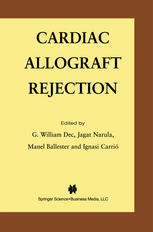

Most ebook files are in PDF format, so you can easily read them using various software such as Foxit Reader or directly on the Google Chrome browser.
Some ebook files are released by publishers in other formats such as .awz, .mobi, .epub, .fb2, etc. You may need to install specific software to read these formats on mobile/PC, such as Calibre.
Please read the tutorial at this link: https://ebookbell.com/faq
We offer FREE conversion to the popular formats you request; however, this may take some time. Therefore, right after payment, please email us, and we will try to provide the service as quickly as possible.
For some exceptional file formats or broken links (if any), please refrain from opening any disputes. Instead, email us first, and we will try to assist within a maximum of 6 hours.
EbookBell Team

4.7
56 reviewsHeart transplantation remains one of the major scientific achievements of twentieth century medicine. During the past four decades, it has evolved from an unproven experimental surgical technique to the most effective form of therapy for refractory end-stage heart disease. It has captured the public's imagination and expanded our understanding of fundamental immunologic mechanisms that are responsible for cellular and humorally-mediated immunity. Despite its successes, many clinical and scientific problems remain. One or more bouts of acute cellular or humoral (vascular) rejection will occur in over 75% of transplant recipients despite current immunosuppressive strategies. Further, rejection directly results in approximately 20% of post-transplant deaths and is believed to play a major role in the development of late allograft dysfunction and coronary vasculopathy.
This book by international experts in the fields of transplantation medicine, immunobiology and cardiac imaging provides the reader with an up-to-date, consise summary of the latest developments in the diagnosis and treatment of acute cardiac rejection. It is axiomatic that a more complete understanding of the pathogenic processes involved in rejection will ultimately lead to its prevention. This volume will be useful to transplant cardiologists, cardiovascular surgeons, cardiac pathologists and transplant scientists who seek to prolong the lifespan and improve the quality of life of their transplant recipients.